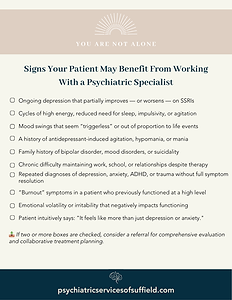
Expert Psychiatric Collaboration for Complex Mood Cases
You care deeply about your patients — and that often means carrying a lot. You're doing your best with the tools you have: managing symptoms, trialing medications, and trying to tease out what’s really going on beneath the surface. But when treatment stalls or symptoms get more complex, it helps to have a trusted psychiatric partner.
That’s where I come in.
.png)
📝Download the Quick Checklist for Referrals to learn more about when to refer to a specialist.
When to Refer for Mood Disorder Evaluation
Patients with mood disorders — especially bipolar spectrum conditions — often present with nonspecific or misleading symptoms. Many have tried multiple antidepressants with little success or worsening symptoms.
Consider referring when your patient:
-
Has had poor or paradoxical response to SSRIs
-
Shows signs of emotional lability, impulsivity, or racing thoughts
-
Has a family history of mood instability
-
Reports mixed features (insomnia, agitation, irritability alongside depression)
-
Is stuck despite multiple medication trials or therapy alone

📝Download this clinical decision-making guide if SSRIs aren't working for your patient.
What to Expect When You Refer
I aim to make the referral process seamless and respectful of your role in the patient’s care. Here's how I work:
-
Referral initiated (via secure form or message)
-
Patient is contacted for intake + consent
-
Comprehensive evaluation (includes diagnostics, history, screeners)
-
Feedback shared with patient and provider
-
Medication management initiated if appropriate
-
Ongoing updates to you as the referring provider
-
Patient returns to you when stable and well-supported
📝
View The Referral Roadmap
to get a visual overview.


My Approach to Psychiatric Care
I specialize in mood disorders — especially bipolar spectrum diagnoses — and I approach every case with clinical depth and collaborative respect.
My evaluations are:
Comprehensive
I take time to assess longitudinal mood patterns, not just symptoms.
Clarifying
I help patients understand their diagnosis, not just receive one.
Intentional
I avoid one-size-fits-all prescribing and move at a thoughtful pace.
The Provider Collaboration Loop

Ongoing Collaboration = Better Outcomes
You’ll never be left wondering what happened after you refer a patient.
I prioritize shared care by:
-
Sending clear feedback after evaluations
-
Including you in key decisions when patients consent
-
Returning stable patients to your care with clear recommendations
-
Remaining available for future consultation
📝
The Mood Mastery Pathway
a visual overview of my 7-step evaluation & stabilization process




.png)